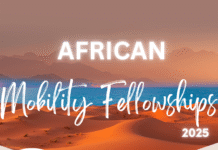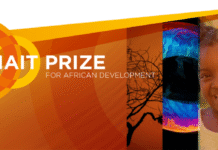Invitation to African Scientists:
Are you an early-stage African scientist with a passion for researching infectious diseases? The GSK Africa Open Lab is extending an invitation for groundbreaking proposals in the realm of infectious disease epidemiology, aetiology, prevention, and control. The call specifically seeks projects addressing critical knowledge gaps and proposing mechanisms to enhance access to medicines and vaccines for infectious diseases across the African continent.
🔬 Research Project Criteria:
The research project, spanning population-based or clinical studies and laboratory-based analysis of field or clinical samples, should be focused on disease areas such as Malaria, Tuberculosis, Antimicrobial resistance (AMR), Enteric infections, Neglected Tropical Diseases, and emerging infectious diseases of particular relevance for Africa. Proposals must not only generate significant data but also demonstrate a commitment to bringing about change in health policy and practice.
🏆 Aim and Benefits:
Successful applicants stand to benefit from up to £100,000 per award, covering a project duration of up to 36 months. This financial support encompasses various project costs, including equipment, fieldwork, data collection, consumables, and research assistance. In addition to financial support, GSK offers scientific mentoring throughout the award term, tailored to the individual needs of the project. Opportunities for training activities and collaboration with global scientists aim to enrich the research experience.
🎓 Requirements for Qualification:
For an applicant to qualify, they must be an African scientist in the early stages of their research and academic career. The principal investigator should hold a graduate degree, with a preference for MSc, PhD, or MD. A track record in health-related research, evidenced by publications and active engagement, is a prerequisite. Applicants must be employed by a research or academic institution in Sub-Saharan Africa (SSA). The call encourages applications from historically underrepresented population groups and institutions.
📝 Application Process:
The application process involves a two-stage review. Interested individuals can access the preliminary concept application form on the GSK Supported Studies website after registration. The completed preliminary concept, along with a CV using the provided template, should be submitted. Recommendations for award funding will be made based on scientific merit, with only successful concept stage applicants invited to submit a full application.
🔍 Selection Criteria:
A scientific panel, including the advisory board of African infectious disease experts and academics, will assess completed proposals. Criteria include the eligibility of the applicant, scientific merit of the proposed project, its significance and potential impact, scalability, and the anticipated impact on the applicant’s career development.
🌐 Global Collaboration for Scientific Excellence:
The GSK Africa Open Lab is not just about funding; it’s a platform for African scientists to contribute significantly to infectious disease research. GSK’s commitment to scientific leadership in Africa is evident in the comprehensive support provided, from financial assistance to mentorship and global collaboration.
⏰ Application Deadline: January 29, 2024 For detailed information and to apply, visit the GSK Supported Studies website. Seize this opportunity to make a lasting impact on infectious disease research and healthcare in Africa. 🌟
Unleashing Potential Through Collaboration: A Path to Holistic Development in African Research
Research collaboration plays a pivotal role in advancing scientific knowledge and driving societal progress, particularly in the African context. The significance of collaborative efforts in research extends beyond individual achievements, offering a myriad of benefits that contribute to the overall development of the continent.
🤝 Pooling Diverse Expertise: Africa is a continent rich in cultural and scientific diversity. Collaborative research brings together experts from various fields, creating a synergy that can address complex challenges more comprehensively. By pooling diverse expertise, researchers can gain holistic insights into multifaceted issues, leading to innovative solutions.
🌍 Global Networking and Exposure: Collaborating with international partners provides African researchers with exposure to global perspectives, methodologies, and cutting-edge technologies. This global networking opens doors for shared learning, fostering a dynamic environment where researchers can stay abreast of the latest advancements in their fields.
🔬 Addressing Complex Challenges: Many of the challenges faced by African nations, such as infectious diseases, healthcare disparities, and environmental issues, require multidisciplinary approaches. Collaborative research allows for a more holistic examination of these challenges, leading to comprehensive and sustainable solutions that consider cultural, economic, and social nuances.
👥 Capacity Building and Skill Transfer: Research collaboration facilitates the exchange of knowledge and skills between institutions and individuals. Through joint projects, African researchers have the opportunity to enhance their expertise, whether in scientific methodologies, data analysis, or project management. This skill transfer contributes to building a robust research infrastructure on the continent.
🌐 Access to Funding and Resources: Collaborative projects often attract more significant funding and resources than individual endeavors. This is particularly crucial for African researchers facing resource constraints. Partnerships with global institutions increase the visibility of African research initiatives, making them more appealing to funding agencies and philanthropic organizations.
🚀 Accelerating Scientific Discovery: Collaboration accelerates the pace of scientific discovery. By working together, researchers can share data, validate findings, and collectively push the boundaries of knowledge. This acceleration is vital for addressing urgent health concerns, such as infectious diseases, and for contributing to the global scientific community.
📊 Influencing Policy and Practice: Collaborative research generates evidence that can influence policy and drive positive change. By engaging with policymakers, practitioners, and local communities, researchers can ensure that their findings translate into actionable policies and practices, addressing real-world issues and improving the well-being of African populations.
In conclusion, research collaboration stands as a cornerstone for African advancement. It not only amplifies the impact of individual efforts but also fosters a culture of shared knowledge, innovation, and progress. As African researchers continue to engage in collaborative endeavors, the continent is poised to make significant contributions to global scientific discourse and shape a brighter future for its people. 🌟
















 The African Research (AR) Index is a comprehensive scholarly directory and database focused explicitly on journal publishers that publish and disseminate African research.
The African Research (AR) Index is a comprehensive scholarly directory and database focused explicitly on journal publishers that publish and disseminate African research.

